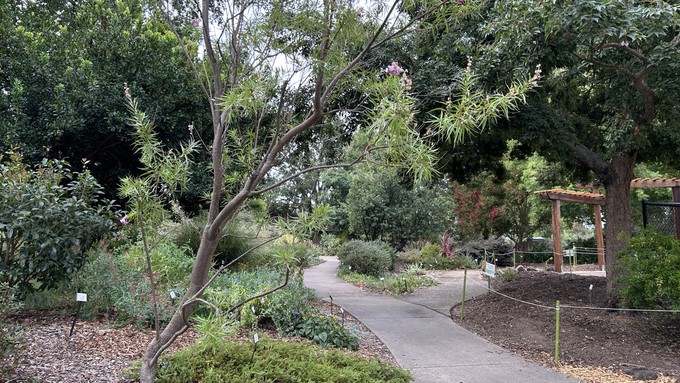
Sacramento master gardeners will be available for questions, tips during Open Garden

The Water-Efficient Landscape at the Fair Oaks Horticulture Center is open to the public daily during daylight hours, but the remainder of the center is open only during Harvest Day and Open Gardens, including this Saturday. Kathy Morrison
After a long hot summer, it's so nice to be in the garden again. With almost-fall weather settling into the region, the Sacramento County master gardeners will open the entire Fair Oaks Horticulture Center to visitors this Saturday morning.
Open Garden Day is held monthly through most of the year. From 9 a.m. to noon, visitors can wander the Horticulture Center and observe the work master gardeners are engaged in. The public is welcome to ask questions and seek advice, either in the FOHC's various gardens or at the "Ask a Master Gardener" table. (Bring samples of problem plants or unknown insects in a zip-top plastic bag.)
Mini talks also are held during the morning. This Saturday's topics and times are:
-- 9:30 a.m. Preparing Your Garden for Winter: Think Tiny (Lower Arbor)
-- 10 a.m. How to Harvest Black Gold from Your Worm Bin (Upper Arbor)
-- 10:30 a.m. Transplanting Nursery Plants for a Healthy Start (WEL Round Arbor)
The master gardeners' 2025 Gardening Guide and Calendar will be on sale during the Open Garden events, as well. It sells for $12, cash or check only at the Open Garden. It's more than a calendar -- it's a whole year of gardening advice in one publication.
Interested in becoming a Sacramento County master gardener? This Open Garden also offers the opportunity to find out about the program from the folks already in it. The application period for the 2025 class opened recently and will run through Oct. 10. (The application form and training information can be found here.)
The Fair Oaks Horticulture Center includes the Water-Efficient Landscape (open daily during daylight hours) and these areas that are open only during Harvest Day and Open Gardens: Orchard, Herb Garden, Berry Patch, Composting, Vegetable Garden and Vineyard. Each area will be staffed Saturday morning.
The Horticulture Center is at 11549 Fair Oaks Blvd., Fair Oaks, just south of the Fair Oaks Library. For more information on Sacramento master gardener events, go to https://sacmg.ucanr.edu/
The final FOHC Open Garden of 2024 will be Wednesday, Oct. 16, from 9 a.m. to noon.
Comments
0 comments have been posted.Sacramento Digs Gardening to your inbox.
Food in My Back Yard Series
May 6: Maintain soil moisture with mulch for garden success
April 29: What's (already) wrong with my tomato plants?
April 22: Should you stock up on fertilizer? (Yes!)
April 15: Grow culinary herbs in containers
April 8: When to plant summer vegetables
April 1: Don't be fooled by these garden myths
March 25: Fertilizer tips: How to 'feed' your vegetables for healthy growth
March 18: Time to give vegetable seedlings some more space
March 11: Ways to win the fight against weeds
March 4: Potatoes from the garden
Feb. 25: Plant a fruit tree now -- for later
Feb. 18: How to squeeze more food into less space
Feb. 11: When to plant? Consider staggering your transplants
Feb. 4: Starting in seed starting
Sites We Like
Garden Checklist for week of May 4
Enjoy this spring weather – and get gardening!
* Plant, plant, plant! It’s prime planting season in the Sacramento area. Time to set out those tomato transplants along with peppers and eggplants. Pinch off any flowers on new transplants to make them concentrate on establishing roots instead of setting premature fruit.
* Direct-seed melons, cucumbers, summer squash, corn, radishes, pumpkins and annual herbs such as basil.
* Harvest cabbage, lettuce, peas and green onions.
* In the flower garden, direct-seed sunflowers, cosmos, salvia, zinnias, marigolds, celosia and asters. (You also can transplant seedlings for many of the same flowers.)
* Plant dahlia tubers. Other perennials to set out include verbena, coreopsis, coneflower and astilbe.
* Transplant petunias, marigolds and perennial flowers such as astilbe, columbine, coneflowers, coreopsis, dahlias, rudbeckia and verbena.
* Keep an eye out for slugs, snails, earwigs and aphids that want to dine on tender new growth.
* Feed summer bloomers with a balanced fertilizer.
* For continued bloom, cut off spent flowers on roses as well as other flowering plants.
* Add mulch to the garden to maintain moisture. Mulch also cuts down on weeds. But don’t let it mound around the stems or trunks of trees or shrubs. Leave about a 6-inch to 1-foot circle to avoid crown rot or other problems.